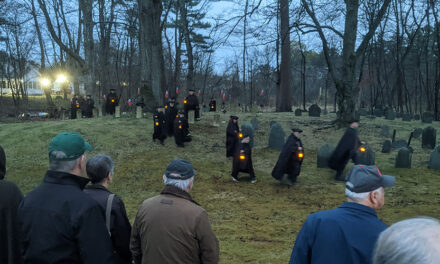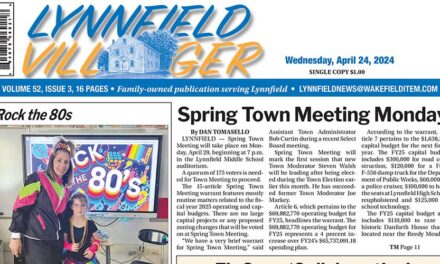By MAUREEN DOHERTY
LYNNFIELD — The town’s department heads will not have to comply with an advisory citizens’ petition passed by Town Meeting last April that sought to have each department prepare two budgets for the voters to consider.
The citizens’ petition sought to advise the selectmen that the town’s omnibus and capital budgets should be presented in two versions — one that would not incorporate the “voluntary 2 1/2 percent increase permitted under Proposition 2 1/2” and the other that would incorporate the “full voluntary 2 1/2 percent increase.”
The selectmen voted 2-1 against requiring the department heads to present two budgets to them as well as to the Finance Committee and ultimately Town Meeting. Selectmen Chairman Dave Nelson and Selectman Phil Crawford voted in favor of not implementing the advisory. Selectman Tom Terranova was in favor of following the advisory passed by Town Meeting and therefore voted against not implementing it.
While the citizens’ petition had passed unanimously at Town Meeting, the department heads were equally unanimous in their opinion that being required to create two budgets simultaneously, one of which they hoped would never pass, would be a waste of an important commodity — the time they would have left in their day to perform the rest of their executive functions over the course of several months.
They also told the selectmen at the Nov. 24 meeting held to discuss whether this task would be required in their current budget deliberations that this exercise would cause employee morale to plummet, significantly hindering their ability to attract and retain the best employees.
The matter needed to be settled because the budget season officially gets underway tonight (Dec. 3) when the department heads and various committees convene at the annual budget summit to discuss the needs of their departments and programs.
Town Administrator Bill Gustus will also presents the FY ‘ 16 budget overview and his FY ‘15 – FY ‘16 revenue and fixed expenditures forecasts. The meeting begins at 7 p.m. at the Senior Center, 525 Salem St.
Town Counsel Thomas Mullen opined that under the Town Charter the key word in the citizens’ petition is “advise” which means the selectmen are “urged” to take a particular action but not legally required to do so and therefore cannot be compelled to take the course of action advised.
Mullen added that even if the word “shall” had been used in the petition, he was still confident the board could legally ignore the request due to the “separation of powers” between Town Meeting, which is the legislative branch, and the Board of Selectmen, which serves as the executive branch. “Town Meeting can advise but cannot require how the Board of Selectmen” exercise their executive power, Mullen said.
On the flip side, Mullen said, Town Meeting is seeking additional information and although a board may be legally justified in ignoring the advisory, doing so could come with political costs. “I am confident that the Board of Selectmen can choose to honor or choose not to honor that vote,” Mullen concluded.
Nelson said he believes it would be “very difficult” for two budgets to be drafted minus approximately $800,000 that would not available in a budget created without the 2 1/2 percent increase, especially considering that about “75 percent” of these budgets are comprised of negotiated salaries and other fixed costs such as “pensions, utilities and health care.”
“The department heads would find their options very limited when drafting budgets especially when trying to avoid layoffs,” Nelson said. “I think it would demoralize our employees to see plans to eliminate their jobs.” He added that the School Department would be hardest hit.
Selectman Phil Crawford concurred, stating that the process would be “devastating.” He said each year, each budget starts at zero “and then we see what has to be added on for the following year.” Crawford questioned the need to go through a duplicate budget exercise to determine “how many people you have to let go and what services you have to cut.”
Selectman Tom Terranova said the town’s new Town Administrator already goes through this task at his current job. “We are looking at this with jaded eyes,” he said, adding that the voters are “intelligent” enough not to vote for budgets with zero increases in spending.
Police Chief Dave Breen said creating two budgets would be “a colossal waste time,” especially knowing in advance that “my vendors charge me more every year.” Furthermore, his department needs to expand, not contract. “The department is barely able to keep up with demands now,” he said.
One way Breen has been able to grow the department while saving money has been through “lateral transfers” of trained officers from neighboring departments, which is less expensive than sending a cadet to the Police Academy. One drawback is the loss of seniority for the transferred officer. Therefore, Breen said, officers considering a lateral transfer would hesitate if they thought the town would not be committed to their career long-term.
Superintendent of Schools Jane Tremblay said 25 percent of the town’s teachers have been with the district for less than three years. “If there is even a whisper” of layoffs and cuts in programs, she believes they will not stay. “So many teachers tell us ‘I’m choosing Lynnfield because the town really values teaching,’” she said.
Tremblay said developing a budget is not done “in two hours or two weeks” but over the course of several months and it involves the “entire leadership team.” Therefore, developing a second budget would keep them all away from their other duties for a longer period of time.
Fire Chief Mark Tetreault summed it up by stating, “You are taking your highest paid people in town and asking them to perform an exercise in futility developing a budget that hopefully would not be passed.”
Tetreault said his department has had a 12 percent increase in call volume this year. “It is unacceptable for the Fire Department to miss a call because you did not have enough people,” he said. Other fixed costs include the medical supplies that they must purchase to stock their ambulances and mandatory continuing education for personnel, in addition to equipment purchases and mechanical repairs.
Town Accountant Julie McCarthy said that they “barely have enough time to get one budget for each department entered into the MUNIS system” in late December by the required deadlines, never mind two.
Town Administrator Bill Gustus said the requests for funds made by department heads need to be vetted one by one, and this is done collaboratively through multiple meetings with him, the Finance Committee and the Board of Selectmen. He believes for Town Meeting to ask the selectmen to present two budgets to them, one with across the board cuts, is “taking the lazy way out.”
“If they don’t like the budget in front of them, they can reduce it” on the floor of Town Meeting, Gustus said, adding, “but to ask the department heads not to put together the budget they feel they need is robbing them of their roles.”
Finance Committee co-Chairman Jack Dahlstedt said, “First let me say I am opposed to presenting multiple budgets to the Town Meeting because I believe the process we go through allows multiple points for anyone to be involved.” However, he interprets the spirit of what the citizens’ petition was trying to accomplish as a request for more information, which is something he does favor.
Dahlstedt explained that a budget without the allowed Prop. 2 1/2 increase would not be a level funded budget because other sources of revenue would still be available to supplement increased costs, such as local receipts.
Their challenge, Dahlstedt said, is finding a way that will enable voters to “consume the information out of our budget in an easier way” in order to improve their confidence that they are getting the budget that they want.




